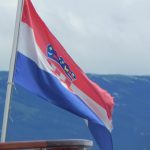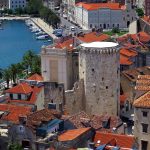October 6, 2019 – The innocence of a child, and what happened when a Yugoslav child, aged 5, found herself transported from former Yugoslavia to a Croatian diaspora community in Australia. The year is 1986.
A few years ago, I went to pick up my daughter from kindergarten in Jelsa. She was 4 at the time. As we walked to the cafe for a cold one for Dad and an ice cream for her, I asked her about her day.
“My friend Ivan is HDZ and my friend Iva is SDP,” she announced.
“What is HDZ and what is SDP?” I asked.
“I have no idea, Daddy, but that is what they are.”
The conditioning of children begins at an early age in Croatia, and I was shocked at how these political divisions and rivalries start at such an early age in Croatian society. We never discuss politics at home (nor do we have any), but by the age of 9, both my daughters could name all the Croatian Presidents, at least 3 Prime Ministers and the names of the mayors of Zagreb, Split and Jelsa. Contrast that with the average British adult who can probably recognise and name no more than 5 or 6.
And so a lot of kids have their political colours painted for them at an age when they should be playing in the park and blissfully unaware of such things. The obsession of dragging Croatia today back to the past at every opportunity when it is politically expedient to do so reinforces these political divisions and the effect they have on even the youngest in this society, at least in my opinion.
That kindergarten declaration has stayed with me for years, and it came back to me this week when I caught up with an Australian returnee friend recently. At least I had always thought that she had been born in Australia and moved to the homeland. She had, in fact, been born in Croatia during Yugoslav times, back in 1981, then moved to Australia when she was five. She moved back to Croatia several years ago to bring kids up in a safer environment.
I asked her what it was like being a Yugoslav child moving to a Croatian diaspora community in Australia. Did she remember the move at all? It turns out that she did, very well in fact. Here is what she told me…
The year is 1986 and this is what the diaspora looked like through the eyes of a five-year-old…
We’re preparing for the adventure of a lifetime, we’re going to Australia. There were what seemed like hours spent in waiting rooms while Mum spoke to people and filled out forms, all of the office spaces looked the same, the same boring shade of dull.
I remember the anticipation and excitement although I have no recollection of the flight, the goodbyes, or the actual airport. I do remember arriving and being amazed at how colourful, shiny and new everything was. Realistically, it was the mid 80’s and most likely it was not all that impressive but it was probably the opposite of the dull hues of communism.
We arrived at our relatives house, everything seemed big and colourful, I asked who the “čiko” in the large photo on the wall was, I distinctly remember the disapproving glares directed at my mum and was told not to use that word, we say “striko,” I asked if the man is my grandfather, it made sense at the time, he too had a photo in a uniform from when he was a young man, more disapproving stares are sent in Mum’s direction, I’m asked some questions that make me feel like Mum is going to get into trouble, so I come to her defence with- well, we have Tito at our house, the funny thing is we didn’t, but I had seen enough of his pictures in the offices we had been to while getting our paperwork done for the visit so I must have thought it would be impressive- it was anything but that.
People would come to visit, I would be encouraged to greet them and not to be shy every time I would say “zdravo” the reaction was one of annoyance or anger, I would be told -say “bog” and to stop saying zdravo, I quickly learned to say “hello” to everyone. I had no understanding of what the problem was, however the more they glared at Mum disapprovingly the more defiant I become.
Things seemed to slowly ease up as I stopped using the words they disapproved of. I don’t know if anyone ever told me why I couldn’t use these words that were commonly used by Croatians living in Croatia, not only would it have most probably been more than a kid could grasp, but I possibly did not understand what they were saying, everyone spoke very differently to what I was used to, a combination of poorly strung together sentences combined with broken English.
One day that I remember vividly is the day I am told I can stay home with my older cousins while the adults run some errands, I was excited, but what was going to be a fun day quickly turned into some sort of quiz and eventually a bottle with a grb is shoved in my face “this is the flag, this is OUR grb, this is our flag” I look at my cousin defiantly and say no, our flag has a red sta- the words hadn’t completely left my mouth when I felt the impact of his hand slap my face so hard it left me stunned.
I don’t remember seeing the sites although I have the photos, but I do remember being excited to finally go home.
Then came a surprise – I am told we are not going home, this is now home. I soon started school, I could already speak some English but was convinced if I didn’t speak I would be able to return to my real home. The teacher asked the children in the class if there was anyone from Yugoslavia, a Macedonian kid raised his hand, the teacher would ask me a question and he would translate, obviously I didn’t understand a word he was saying, but would nod yes or no when he was finished, it was short-lived as Mum explained we didn’t speak the same language and the teacher then knew I understood her.
Then we moved, I would be attending a Catholic school with a large Croatian population, so it would be so much easier they said. I was still the new kid when we were told to draw the flag of where our parents were originally from, I drew the one from my passport, the only flag I had ever seen while in Croatia, blue, white, red, with a big red star in the middle. The other Croatian kids drew the Croatian flag, the flags were displayed in the window for everyone to see how multicultural and inclusive our class was, in the days that followed I was called a Serb and a Yugoslav. ‘Communist’ was later added to the repertoire, they probably had no idea what it meant, just as I didn’t. Some of the older Croatian kids were relentless, and I often spent recess hiding. It passed, as all things do.
Although it did cement the feeling that I did not belong.
High school was different, I never felt the need to have Croatian friends as my peers did, I felt different to them, even though it was the 90’s and more important than ever to prove just how Croatian you are, I didn’t feel the need to talk about ustasha or wars or other things I knew little about to prove just how Croatian I was. I no longer had a yearning desire to belong either. I had fond memories of where I was from, of people who were kind, a place where I had once belonged, I felt no need to prove anything to kids who challenged just how Croatian I was, and yet had never been to Croatia and barely spoke the language. The friends I did have didn’t care about how Croatian I was, they were like-minded. I felt a sense of belonging with them that I never had with the Croatian kids who had tormented me.
I attended Croatian language classes every Saturday throughout high school. Croatian communities are generally run like the country itself- “preko veze.” So most of my Croatian language teachers spoke Croatian like the vast majority of young people – hardly at all. What was once a quiet shy kid, was now an angsty teenager, I took great pleasure in antagonising the teachers by correcting their grammar and challenging their knowledge of the language. The other smart arse kids would have dictionary handy to prove me right, I spent a lot of time outside that classroom door.
In all fairness there were some teachers whose language skills were better, they rambled on about Croatian history that came from no history book in particular, just an uneducated interpretation, stories about Ante Pavelić, the man that was in the picture on the wall, the first image that had taught a five-year-old what it felt like to be foreign and unaccepted.
As an adult I came to understand that this diaspora was an older generation who left a long time ago, with views that were out of touch with the issues of the current time. Their views had not evolved and moved on as had the people living in Croatia, but they were passed on to younger generations, they nostalgically hung onto the past completely unaware. Much like today while most nations are united by patriotism, we are often divided by it.







